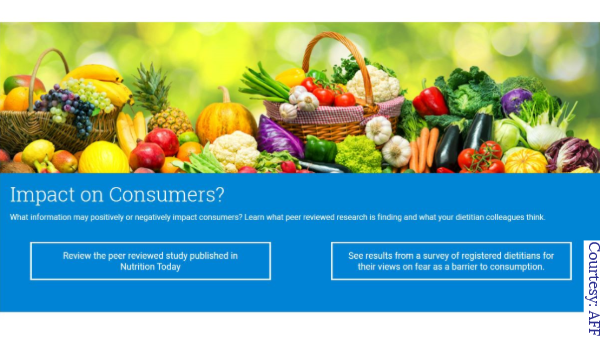(Watsonville, CA) Peer reviewed research and a survey of registered dietitians has shown the potential negative impact on fruit and vegetable consumption among consumers caused by the so-called “dirty dozen” list.
Further, the “dirty dozen” list has been repeatedly discredited by the scientific community as well as peer reviewed studies and the list authors readily state they do not follow any established risk assessment protocols in the development of this list rendering their claims unsupportable.
“Last year, the Environmental Working Group (EWG) faced significant criticism from the nutrition community for inaccurately escalating and perpetuating consumer safety fears about these healthy foods as our world was locking down due to the pandemic,” says Teresa Thorne, Executive Director of the Alliance for Food and Farming (AFF).
“EWG continues to dismiss the needs of consumers and disrespect farmers by choosing to inaccurately disparage the very foods health experts agree we should eat more of every day to improve immune function, prevent diseases and increase lifespan.”
“With only one in 10 Americans eating enough fruits and vegetables each day, we should be promoting consumption to enhance immune function and prevent illness, not discouraging it with tactics like the ‘dirty dozen’ list,” Thorne adds.
Scientifically Unsupportable
Peer reviewed research found that the substitution of organic forms of produce for conventional forms, as suggested in the “dirty dozen” list, does not result in any decrease in consumer risk because residues are so low, if present at all.
The AFF also asks that reporters, consumers and others review the United States Department of Agriculture’s (USDA) Pesticide Data Program (PDP), which the list authors state they base the “dirty dozen” list upon.
The USDA PDP report consistently finds 99 percent of the samples tested had residues well below the safety standards established by the Environmental Protection Agency (EPA) with more than 40% having no detectable pesticide residues at all.
EWG clearly states in their “dirty dozen” report that they do not follow basic rules of risk assessment. From EWG’s website: “The Shoppers Guide does not incorporate risk assessment into the calculations. All pesticides are weighted equally, and we do not factor in the levels deemed acceptable by the EPA.”
“To accurately assess consumer risks from pesticides, one needs to consider three major factors 1) the amount of residue on the foods, 2) the amount of food consumed, and 3) the toxicity of the pesticides. The methodology used by EWG ignores all three,” explains Dr. Carl Winter, Extension Toxicologist Emeritus, University of California, Davis.
Discourages Consumption
A peer reviewed study published in Nutrition Today found that misleading messaging perpetuated in the “dirty dozen” list which inaccurately describes certain produce items as having “higher” pesticide residues results in low income consumers stating they would be less likely to purchase any fruits and vegetables – organically or conventionally grown.
Further, a survey among registered dietitians found that 94% agreed that inaccurate, fear-based messaging regarding pesticide residues has a negative impact on consumers because it causes misplaced concern about whether conventionally-grown fruits and vegetables are safe to eat.
And, when shown infographics from the “dirty dozen” list authors, an overwhelming 95% of dietitians agreed that the group’s misinformation about residues discourages consumption among their clients and consumers.
Consumers who are concerned about residues are advised to simply wash their fresh produce – organic and conventionally grown.
According the Federal Food and Drug Administration, washing fresh fruits and vegetables under running tap water is a healthful habit and can help remove or eliminate any residues that may be present on fruits and vegetables.
“We want people to know that whatever fruits and vegetables they choose – organic or conventional – they are safe and can be consumed with confidence,” Thorne says. “Be reassured that the correct and healthy choice is to always eat more. Don’t let anyone or any group discourage you from eating the produce you prefer and is affordable and accessible for you and your family.”
For more information about produce safety visit safefruitsandveggies.com
Addendum:
Statement from Dr. Carl Winter, Extension Toxicologist Emeritus, University of California, Davis regarding EWG claims about internal citrus sampling:
The mere detection of imazalil and thiabendazole on citrus is not sufficient to imply harm. We need to continue to respect the first principal of toxicology: “the dose makes the poison.”
Here are results from a study published in 2015 that estimated U.S. chronic dietary exposure to pesticides from all (not just citrus) foods in the diet. Doses are compared with the chronic reference dose, which represents the minimum level of any toxicological concern and is derived from identifying the highest dose given in lifetime toxicology studies to the most sensitive animal species that does not demonstrate any harm divided by an additional uncertainty factor (typically 100).
Imazalil:
Average exposure – 0.5742 ng/kg/day
Chronic reference dose – 13,000 ng/kg/day
Percentage of chronic reference dose: 0.0044%
Thiabendazole:
Average exposure – 77.7198 ng/kg/day
Chronic reference dose – 100,000 ng/kg/day
Percentage of chronic reference dose: 0.078%
Assuming that the chronic reference dose represents a level 100 times lower than a dose that has not demonstrated any harm in the most sensitive animal species exposed daily throughout a lifetime, our typical daily exposures to imazalil and to thiabendazole are roughly 2.26 million and 129,000 times lower, respectively, than levels that do not cause any effects in animals.
About Us
The Alliance for Food and Farming is a non-profit organization formed in 1989 which represents organic and conventional farmers. Alliance contributors are limited to farmers of fruits and vegetables, companies that sell, market or ship fruits and vegetables or organizations that represent produce farmers. Our mission is to deliver credible information about the safety of fruits and vegetables.
Contact:
Teresa Thorne
(831) 786-1666 Office
(831) 840-3774 – Cell
tthorne@foodandfarming.info



